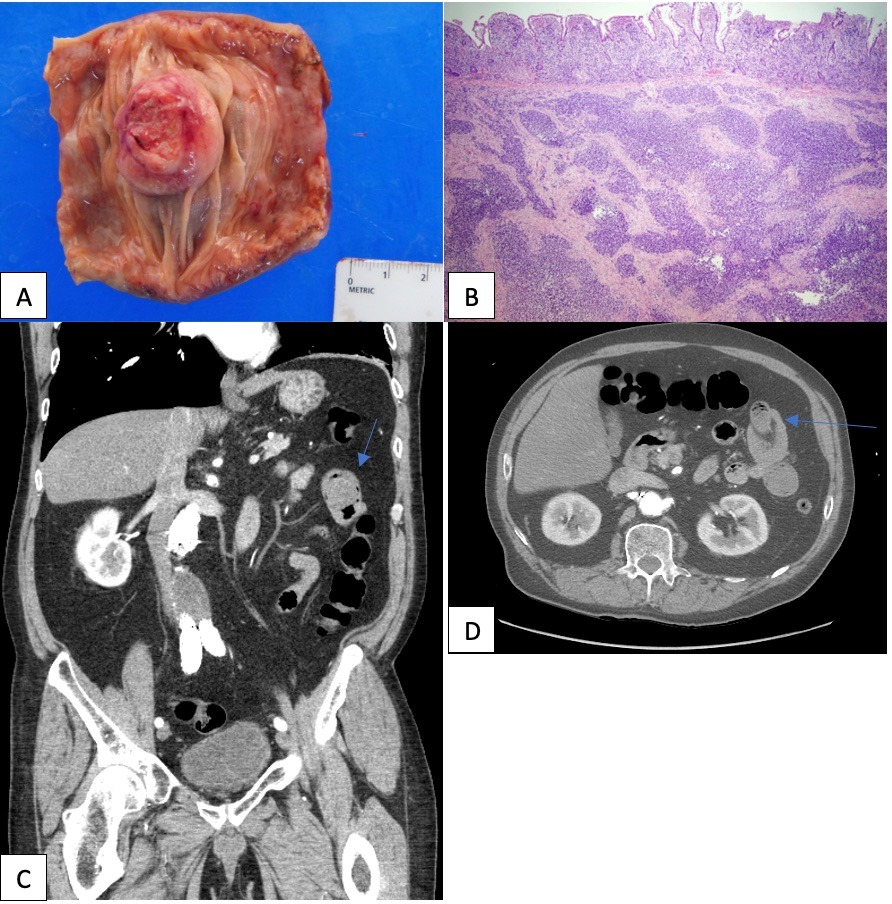Back
Poster Session C - Monday Afternoon
C0656 - A Case of Jejuno-Jejunal Intussusception Caused by Underlying Metastatic Melanoma
Monday, October 24, 2022
3:00 PM – 5:00 PM ET
Location: Crown Ballroom

Hardeep S. Ahdi, DO
Advocate Lutheran General Hospital
Chicago, IL
Presenting Author(s)
Hardeep S. Ahdi, DO1, Nahren Asado, MD2, David H. Kruchko, DO2, Samir Kakodkar, MD2
1Advocate Lutheran General Hospital, Chicago, IL; 2Advocate Lutheran General Hospital, Park Ridge, IL
Introduction: Intussusception in adults is a rare finding, with 95% of cases occurring in the pediatric population. If seen in adults, there should be a high degree of suspicion for a neoplastic process serving as the pathological lead point. Imaging is the primary modality for diagnosis, but exploratory laparotomy is often required posing an increased risk for morbidity and mortality.
Case Description/Methods: We present a 64-year-old male with history of alcoholism, 94 pack-year smoking, CAD on aspirin 81 mg daily, AAA repair, and Stage IV melanoma initially diagnosed in 2010 with mets to intestines/brain. He was treated with immunotherapy and brain radiation in 2015. He had been off medications for 5 years, with negative PET Scan within 2 years, who presented with 4 days of melanic stools and abdominal discomfort. Last colonoscopy 14 years prior demonstrated multiple tubular adenomas. On arrival, vital signs notable for mild tachycardia. Physical exam revealed conjunctival pallor and mild abdominal tenderness to palpation without rebound/guarding. Labs revealed hemoglobin 10.7 g/dL, platelet count 253,000/µL, AST 40, ALT 63, BUN/Cr 26, INR 1.0. An upper endoscopy showed mild duodenitis. Gastric biopsies were negative for H pylori and duodenal biopsies suggested gastric metaplasia and Brunner’s glands hyperplasia. Given his vascular risk factors, CTA was obtained which revealed no evidence of active contrast extravasation but did demonstrate jejuno-jejunal intussusception with focal wall thickening for which an underlying lesion was difficult to exclude. He underwent exploratory laparotomy with findings of an 8cm intussuscepted bowel with a lead point mass that was resected with pathology revealing metastatic melanoma 3.1 x 2.7cm involving entire wall of small bowel.
Discussion: Melanoma is one of the most rapidly progressive cancers. Metastasis of cutaneous malignant melanoma causing intussusception is a unique finding with few causes reported. Intussusception in adults can present with non-specific symptoms, and metastatic disease should be on the differential in any patient with history of melanoma. Unfortunately, about 50% of all patients treated for metastatic melanoma will eventually relapse, with about 20% being local, 50% in regional lymph nodes, and 30% with distant metastases [1]. Early detection increases the likelihood that the cancer is amenable to treatment (i.e., surgical resection) and exploratory laparotomy should be performed promptly in the right clinical context

Disclosures:
Hardeep S. Ahdi, DO1, Nahren Asado, MD2, David H. Kruchko, DO2, Samir Kakodkar, MD2. C0656 - A Case of Jejuno-Jejunal Intussusception Caused by Underlying Metastatic Melanoma, ACG 2022 Annual Scientific Meeting Abstracts. Charlotte, NC: American College of Gastroenterology.
1Advocate Lutheran General Hospital, Chicago, IL; 2Advocate Lutheran General Hospital, Park Ridge, IL
Introduction: Intussusception in adults is a rare finding, with 95% of cases occurring in the pediatric population. If seen in adults, there should be a high degree of suspicion for a neoplastic process serving as the pathological lead point. Imaging is the primary modality for diagnosis, but exploratory laparotomy is often required posing an increased risk for morbidity and mortality.
Case Description/Methods: We present a 64-year-old male with history of alcoholism, 94 pack-year smoking, CAD on aspirin 81 mg daily, AAA repair, and Stage IV melanoma initially diagnosed in 2010 with mets to intestines/brain. He was treated with immunotherapy and brain radiation in 2015. He had been off medications for 5 years, with negative PET Scan within 2 years, who presented with 4 days of melanic stools and abdominal discomfort. Last colonoscopy 14 years prior demonstrated multiple tubular adenomas. On arrival, vital signs notable for mild tachycardia. Physical exam revealed conjunctival pallor and mild abdominal tenderness to palpation without rebound/guarding. Labs revealed hemoglobin 10.7 g/dL, platelet count 253,000/µL, AST 40, ALT 63, BUN/Cr 26, INR 1.0. An upper endoscopy showed mild duodenitis. Gastric biopsies were negative for H pylori and duodenal biopsies suggested gastric metaplasia and Brunner’s glands hyperplasia. Given his vascular risk factors, CTA was obtained which revealed no evidence of active contrast extravasation but did demonstrate jejuno-jejunal intussusception with focal wall thickening for which an underlying lesion was difficult to exclude. He underwent exploratory laparotomy with findings of an 8cm intussuscepted bowel with a lead point mass that was resected with pathology revealing metastatic melanoma 3.1 x 2.7cm involving entire wall of small bowel.
Discussion: Melanoma is one of the most rapidly progressive cancers. Metastasis of cutaneous malignant melanoma causing intussusception is a unique finding with few causes reported. Intussusception in adults can present with non-specific symptoms, and metastatic disease should be on the differential in any patient with history of melanoma. Unfortunately, about 50% of all patients treated for metastatic melanoma will eventually relapse, with about 20% being local, 50% in regional lymph nodes, and 30% with distant metastases [1]. Early detection increases the likelihood that the cancer is amenable to treatment (i.e., surgical resection) and exploratory laparotomy should be performed promptly in the right clinical context

Figure: 1A: Opened small intestine resection specimen shows 3.1cm, umbilicated mass extending into lumen
1B: Nests of tumor cells diffusely invasive into mucosa (top), submucosa (mid), and muscularis propria (bottom)
1C: Arrow pointing to the metastatic lesion with surrounding air, viewed in coronal plane
1D: Arrow targeting the intussusception viewed in axial plane.
1B: Nests of tumor cells diffusely invasive into mucosa (top), submucosa (mid), and muscularis propria (bottom)
1C: Arrow pointing to the metastatic lesion with surrounding air, viewed in coronal plane
1D: Arrow targeting the intussusception viewed in axial plane.
Disclosures:
Hardeep Ahdi indicated no relevant financial relationships.
Nahren Asado indicated no relevant financial relationships.
David Kruchko indicated no relevant financial relationships.
Samir Kakodkar indicated no relevant financial relationships.
Hardeep S. Ahdi, DO1, Nahren Asado, MD2, David H. Kruchko, DO2, Samir Kakodkar, MD2. C0656 - A Case of Jejuno-Jejunal Intussusception Caused by Underlying Metastatic Melanoma, ACG 2022 Annual Scientific Meeting Abstracts. Charlotte, NC: American College of Gastroenterology.

